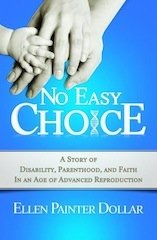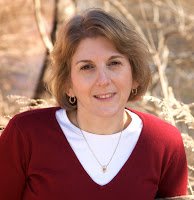Ellen Painter Dollar on Reproductive Technologies
Ellen Painter Dollar is a writer who focuses on faith,family, disability, and ethics. She is the author of the recently releasedbook,
No Easy Choice: A Story ofDisability, Parenthood, and Faith in an Age of Advanced Reproduction(Westminster John Knox, 2012). Part memoir, part journalism, and part theology,the book examines the ethical questions raised by reproductive technologies,particularly genetic screening of embryos. Dollar's interest in this topicstems from her own experience as someone with a genetic bone disorder whosethree children had a significant chance of inheriting her disorder. Her oldestdaughter did inherit the disorder, and Dollar writes about living withdisability, gratitude and suffering, and the difficult choices made possible byreproductive technologies and genetic testing.
Recently,she took time to do some Q-and-A with me about her book:
Publishers Weekly describes your book as “part memoir, parttheological treatise.” What is the story behind the “memoir” part of your book?
I have a genetic bone disorder called osteogenesisimperfecta, or OI. The hallmark symptom is bones that break easily, and I havehad about three dozen broken bones. Any child I conceive has a 50 percentchance of inheriting OI, and our first daughter (who is now 12) did inherit.
Between her second and fourth birthdays, our daughter hadsix broken bones. This also happened to be the time that my husband and I werethinking about having another child. Here we were, caring for a child who spentone entire summer in a variety of casts for a variety of broken bones, feelingcompletely overwhelmed by the idea of having two fragile children.
We decided to do a cycle of preimplantation geneticdiagnosis (PGD), which is essentially in vitro fertilization (IVF) but with theadded step of testing fertilized eggs for a particular genetic mutation—in thiscase, the mutation causing my and my daughter’s OI. Our cycle failed and Ididn’t become pregnant.
During our PGD journey, I became kind of obsessed with theethical, moral, and theological questions around using this technology. I wasthinking about things like: Do I have a moral duty to help my children avoidsuffering? Am I devaluing the lives of people living with disabilities,including my own, by using this technology? Is reproductive technology just onemore pressure on modern parents to make sure they produce perfectly healthy,successful children? What are the blessings and burdens of our increasingchoices and control over childbearing?
I found that there were few places for someone like me—aneducated person who nevertheless doesn’t gravitate toward heavily academic material,particularly when it comes to something as intimate as having babies—to turnfor help with those questions.
Ultimately, we chose not to do any more PGD cycles, forethical, emotional, and financial reasons. We went on to conceive two morechildren naturally, neither of whom inherited OI. And then I went on to doextensive reading and research into the ethical questions related toreproductive technology, and to write this book.
There are some wonderful memoirs out there dealing with thesame questions I wrote about, such as infertility, reproductive technology,genetic screening, and genetic disabilities. But while I love a great memoir, Ithink they have limited utility for helping other people with theirdecision-making. And that’s part of what I wanted to do. I wanted to use mystory as a springboard for a wider ranging discussion of the intersection ofChristian faith with reproductive technologies. So at my editor’s suggestion, Isupplemented my story with a more journalistic discussion of particularethical/theological questions that my story raises. Ultimately, I hope that theaddition of such discussion makes this a more useful book. People can use it tobecome educated about reproductive technology, not just about my story.
You wrote No Easy Choice from your perspective asa Christian. Are Christians your primary intended audience?
Yes and no. As a Christian, that’s the primary vantage pointfrom which I was assessing the technologies available to us for conceiving ahealthy baby. I think that Christianity has some unique things to add to thelarger cultural discussion about reproductive technology, because first, wefollow Jesus, who made clear that cultural propensities to value certain typesof people (healthy, wealthy, educated, etc.) over other types of people aremisguided. Second, Christ’s suffering on the cross offers a redemptive view ofsuffering, which affects how we view such things as illness and disability. Soyes, I was writing as a Christian, and think that Christians will be mostlikely to find an ethical framework in the book that makes sense.
But I wrote the book from a fairly broad Christianperspective. You don’t have to be a certain kind of Christian or have certainfaith-based views on particular social issues (such as abortion) to getsomething from this book. I’ve been gratified to hear not only from awide-ranging spectrum of Christian readers, including evangelicals andmainliners, liberals, and conservatives, but also from several agnostic andatheist readers, that they got a lot of value from the book. That was my goal,because I think when we Christians write books that will only appeal to acertain subset of Christians, we’re not adequately engaging the culture. Suchbooks aren’t likely to make any difference in the long run, because then we’rejust preaching to the choir.
What do you hopereaders will learn or come away with after reading the book?
My goal with this book was very clear. I’m not trying toconvince anyone that reproductive technology is right or wrong, good or bad.Rather, I’m hoping to bolster more informed and robust conversations—bothprivate and public—about the promises and perils of reproductive technology. Ihope people who read the book feel like they learned useful information, and Ialso hope that they are more compassionate and understanding of people who haveto make very difficult and complex reproductive decisions.
Dollar has also written for the American MedicalAssociation, the Osteogenesis Imperfecta Foundation,
Christianity Today, and the
HuffingtonPost. She regularly does media interviews and speaks to community, student,church, and book groups. You can learn more at her web site at ellenpainterdollar.com.

